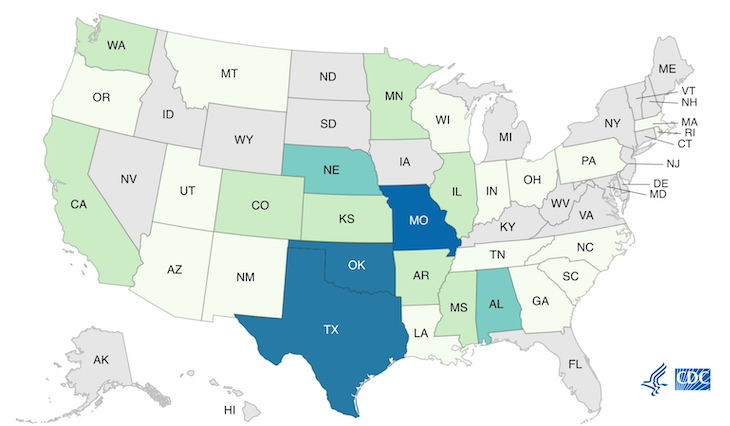A backyard poultry Salmonella outbreak has sickened at least 109 people in 29 states, according to the Centers for Disease Control and Prevention (CDC). Any backyard poultry, including chickens and ducks, can carry Salmonella bacteria even if they look healthy and clean.

The case count by state is: Alabama (6), Arizona (1), Arkansas (5), California (3), Colorado (3), Georgia (2), Illinois (4), Indiana (1), Kansas (4), Louisiana (1), Massachusetts (1), Minnesota (5), Mississippi (3), Missouri (19), Montana (2), Nebraska (6), New Mexico (2), North Carolina (1), Ohio (1), Oklahoma (11) Oregon (2), Pennsylvania (2), Rhode Island (2), South Carolina (1), Tennessee (1), Texas (14), Utah (1), Washington (3), and Wisconsin (2). There are 33 people hospitalized because they are so sick. The patient age range is from less than one to 93 years, with the median age of 10. Forty-three percent of the patients are under the age of 5.
The hospitalization rate is 40% because of 82 people who gave information to investigators, 33 have been hospitalized. This is a very high hospitalization rate for a Salmonella outbreak. And the true number of ill persons in this outbreak is likely much higher, since many people do not go to a doctor when they contract a Salmonella infection and are not tested.
People reported purchasing poultry from multiple retail stores and directly from a hatchery. Multiple hatcheries supplied birds to the stores. A common poultry supplier has not yet been identified across all outbreaks.
Whole genome sequencing conducted on isolates from patients showed that the pathogens are closely related genetically. That means that people in this backyard poultry Salmonella outbreak likely got sick from the same type of animal.
Investigators in Ohio and Utah collected samples from inside the boxes used to ship poultry, including the box liner and bedding. They found Salmonella Altona and Salmonella Mbandaka. Whole genome sequencing showed that these pathogens are the same strain as the ones that made people sick.
If you choose to keep backyard poultry, follow safety precautions. Always wash your hands with soap and water after handling the birds, their eggs, or anything in the area where they live and roam. Do not kiss or snuggle the birds and do not let your children handle them this way. Supervise children around the birds. Do not let children under the age of five touch chicks, ducklings, or other backyard poultry. Children of this age are more likely to contract infections and are more likely to get very sick.
Handle eggs safely. Collect them often. Throw cracked eggs away. Rub off dirt with a brush, cloth, or fine sandpaper. Do not wash eggs because colder water can pull germs into the eggs. Refrigerate eggs. And cook eggs, as well as any recipes made using them, until both the yolk and white are firm, to a temperature of 160°F.




